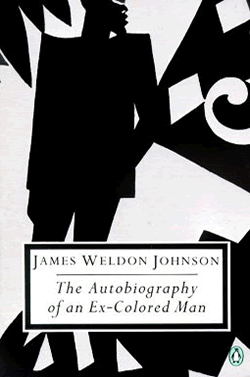 The Autobiography of an Ex-Colored Man (1912) by James Weldon Johnson
The Autobiography of an Ex-Colored Man (1912) by James Weldon JohnsonJohnson first made his appearance on my literary radar while I was furiously reading for my grad school prelim exams ("American Literature: 17th c. - WWII"). I had heard his name in passing, usually in association with W. E. B. Du Bois and early-20th century African American literature and culture. Never, though, had a book of his crossed my desk.
AND THEN.
I read Autobiography of an Ex-Colored Man and a couple of things smacked me across the face. First: that this novel raised the same kinds of questions that Charles W. Chesnutt, Pauline Hopkins, and Nella Larson raised in their novels about racial "passing" and African American identity between Reconstruction and WWII (a particularly violent and bloody time for African Americans). Second, this novel had an opera scene in it! (This second point was also important because I was planning on writing a dissertation about opera in American literature and I was always on the lookout for texts that fit the bill.)
But back to Autobiography. This is often what Johnson is known for nowadays, but in fact he was a very prolific writer, educator, lawyer, diplomat, songwriter, and early civil rights activist. He brought his insight and knowledge about racism, identity, and music to this novel (it isn't actually an autobiography) that charts the life of a mixed-race boy who is also a piano prodigy. Raised by his black mother but always curious about his absent white father (and the culture he represents), the unnamed narrator embarks on a journey across the country and then throughout Europe, making connections between race and musical culture that inform his own understanding of identity.
Classically trained in the western European musical tradition, the narrator ultimately returns to the music his mother once taught him and decides to gather and arrange African American folk music in his attempt to become a major black composer. The ex-colored man's desire "to voice all the joys and sorrows...of the American Negro, in classical form" is ultimately shattered, though, after he witnesses a lynching in a small Southern town. Ultimately, Johnson condemns the ex-colored man for seeking an easier path to success in white America by passing as white instead of proudly accepting his mixed heritage and using it to put pressure on old and familiar racial, musical, and national boundaries.
How much richer did this novel seem, though, after I also read Johnson's many essays on race and music? He even wrote comic operas about American imperialism, and the libretto for a Spanish opera that had its world premier at the Met. Dude was versatile, and good at ALL of it. His novel explores some of the most painful questions facing Americans in the early 20th century, including how the nation's many mixed-race individuals could establish themselves in a society tragically obsessed with race and racial barriers. Johnson's articulation of these major problems in American culture and his suggestions for reform have rightly established him as one of our greatest writers.
So go read Ex-Colored Man. You'll thank me.
Thanks for posting this! I just found Ex-Colored Man in a thriftstore in one of those "blink" moments: knew nothing about it but sensed it was important. Great review!
ReplyDelete